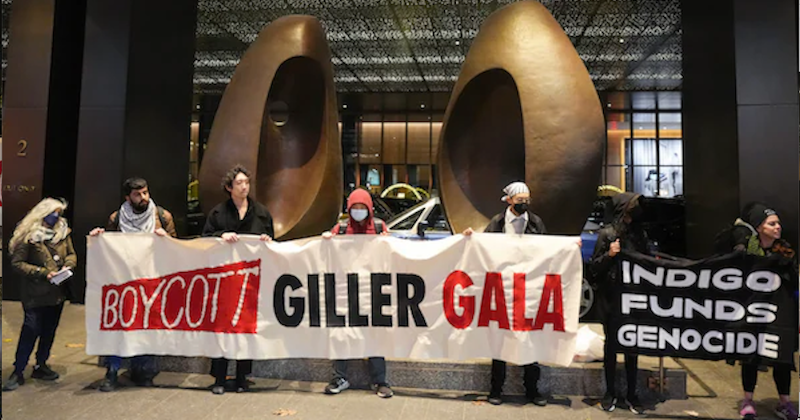The book world’s most bloodstained award was handed out in Toronto last night.
The gala for the Giller Prize—formally Canada’s most prestigious literary award, now synonymous with artwashing genocide and apartheid—took place at Toronto’s Park Hyatt hotel last night.
Anne Michaels received the 2024 prize for her novel Held. Michaels is a poet and author who has previously won the Orange Prize for Fiction, the Guardian Fiction Prize, the Commonwealth Poetry Prize, the Trillium Book Award, and a Guggenheim Fellowship. Before taking home this year’s prize, she was shortlisted for the Giller Prize twice: in 1996 for Fugitive Pieces and in 2009 for The Winter Vault.
In her somewhat baffling acceptance speech, Michaels didn’t mention Palestine or the boycott or the writers killed in Gaza, but did declare that she was “standing here tonight in solidarity with Canadian publishers and booksellers.”
The event—which, incredibly, began with a land acknowledgment—went ahead despite over 200 Canadian authors having refused to submit their books for Giller Prize consideration or participate in any Giller-related publicity until the Foundation “drops its partnerships with corporate sponsors complicit in the genocide of Palestinians.” [Scotiabank, Indigo Books, and the Azrieli Foundation are the sponsors in question. The allegations against them are detailed at the close of this piece.]
Outside the gala, dozens of authors and book workers formed a picket line and staged a “Boycott Giller” counter gala, while across Canada, a series of simultaneous events were held to centre Palestinian liberation and the writers who have committed to boycotting the Giller Foundation.
While the Giller Prize cancelled its 2024 “Between the Pages” tour, which typically features readings across Canada highlighting its shortlist, writers working with No Arms in the Arts and CanLit Responds organized their own tour, in solidarity with authors who withdrew their work from the 2024, those who have committed to boycotting future Giller events, and Palestinian writers. Writers gathered in Fredericton, Montreal, Halifax, Winnipeg, and Vancouver to stage their “No Arms in the Arts” Tour, many reading the work of Palestinian authors, as well as their own poetry of resistance and liberation.
As the activist group CanLit Responds detailed in a press release sent yesterday, this counter programming was just the latest in a series of actions that date back to last year’s disrupted Giller Prize ceremony:
Last year’s award’s ceremony saw disruptors take the stage during a live broadcast in protest of Scotiabank. Three arrests were made that night, and as confirmed by reporting in The Walrus, it was Giller organizers themselves who lobbied police to criminally charge the demonstrators. Two more arrests have been made in the year since, including one that occurred as late as September.
In response, 2000+ authors wrote a letter of solidarity with the protestors under the banner of Canlit Responds calling for the charges against them to be dropped. In Spring, Canlit Responds joined other culture sector groups under the No Arms in the Arts campaign, using Scotiababank’s sponsorships of art institutions like Hot Docs and the CONTACT Photography Festival to target the bank’s Elbit stake.
After months of silence from the Giller Foundation, an organized boycott of the Giller Prize was launched. On July 10, 2024, authors with 2024-eligible books withdrew their works from prize consideration until the Prize dropped its ties to Scotiabank, Indigo, and the Azrieli Foundation. Other past Giller nominees and winners joined them on the picket line, pledging not to participate in Giller publicity or events until demands were met. Over 40+ authors signed. On July 11, Giller organizers released their first fulsome response to the Canlit community around Scotiabank, which was to double down on their commitment to the partnership.
Last month, that boycott was extended beyond the 2024 Giller prize season, and will continue for as long as the Giller retains these sponsors. Over 300 authors and book workers have since pledged not to participate in Giller programming, publicize Giller events, or submit their books for the Giller Prize.
Where the Giller Prize goes from here is anyone’s guess. The damage done by this protracted debacle seems incalculable, and unlikely to be repaired any time soon. The Canadian book scene has been roiled by scandals over the past year, with some of its most beloved authors and institutions suffering high-profile falls from grace.
Perhaps it’s time to reimagine the literary landscape up North.
**
In yesterday’s press release, CanLit Responds also provided a detailed breakdown of the Giller sponsors’ ties to both the Israeli military and the Israeli real estate sector:
Scotiabank, the Giller’s lead sponsor. Scotiabank retains a significant stake in Israeli arms manufacturer Elbit Systems. Elbit Systems produces 85% of the Israeli military’s drones, and 85% of its land based equipment, and has been historically linked to internationally-banned white phosphorus and cluster bombs. Scotiabank began the year as Elbit’s largest foreign shareholder, but No Arms in the Arts and Canlit Responds have contributed to a nationwide pressure campaign that has resulted in Scotiabank cutting that stake by $400 million. Elbit Systems’ own CEO credited the bank’s divestment to this political pressure. Scotiabank still remains substantially invested in Elbit, and retains a stake of roughly $112 million.
Indigo Books. Gerald Schwartz and Indigo CEO Heather Reisman, who both recently took the book chain private, are also the founders and sole major contributor to the HESEG Foundation. HESEG – founded in 2005 as “The HESEG Foundation For Lone Soldiers” – provides financial subsidies for non-Israeli citizens serving in the Israeli military. This means Indigo profits fund tax-subsidized support for a military currently carrying out mass death and ethnic cleansing against Palestinians. It also does so in defiance of Canadian charity law, which forbids registered charities from financially supporting foreign militaries. When an Indigo storefront was flyered with posters objecting to the company’s ties to HESEG, Toronto Police took the drastic measure of arresting 11 suspects with violent, no-knock, early morning raids – revealed to be prompted by a personal call from Heather Reisman herself to the chief of police.
The Azrieli Foundation. The Azrieli Foundation is the charitable counterpart to Israeli real estate company The Azrieli Group, which has had past and present investments in West Bank settlements deemed illegal under international law. This includes their previous ownership of the Sonol gas station chain, which operated on illegal settlements, and their current stake in Bank Leumi, which does business on and funds infrastructure for illegal settlement projects. Leumi also recently froze the bank account of UNWRA, contributing to the suspension of relief funds to Palestinian refugees.





